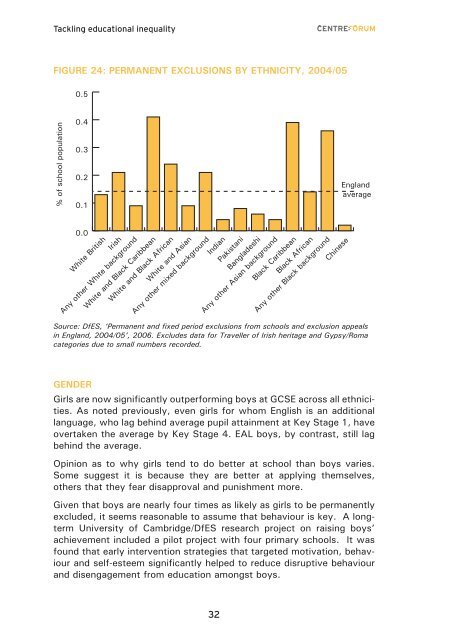Tackling educational inequality - CentreForum
Tackling educational inequality - CentreForum
Tackling educational inequality - CentreForum
Create successful ePaper yourself
Turn your PDF publications into a flip-book with our unique Google optimized e-Paper software.
<strong>Tackling</strong> <strong>educational</strong> <strong>inequality</strong><br />
Figure 24: Permanent exclusions by ethnicity, 2004/05<br />
0.5<br />
% of school population<br />
0.4<br />
0.3<br />
0.2<br />
0.1<br />
0.0<br />
White British<br />
Irish<br />
Any other White background<br />
White and Black African<br />
White and Black Caribbean<br />
White and Asian<br />
Any other mixed background<br />
Indian<br />
Pakistani<br />
Bangladeshi<br />
Any other Asian background<br />
Black Caribbean<br />
Black African<br />
Any other Black background<br />
Chinese<br />
England<br />
average<br />
Source: DfES, ‘Permanent and fixed period exclusions from schools and exclusion appeals<br />
in England, 2004/05’, 2006. Excludes data for Traveller of Irish heritage and Gypsy/Roma<br />
categories due to small numbers recorded.<br />
Gender<br />
Girls are now significantly outperforming boys at GCSE across all ethnicities.<br />
As noted previously, even girls for whom English is an additional<br />
language, who lag behind average pupil attainment at Key Stage 1, have<br />
overtaken the average by Key Stage 4. EAL boys, by contrast, still lag<br />
behind the average.<br />
Opinion as to why girls tend to do better at school than boys varies.<br />
Some suggest it is because they are better at applying themselves,<br />
others that they fear disapproval and punishment more.<br />
Given that boys are nearly four times as likely as girls to be permanently<br />
excluded, it seems reasonable to assume that behaviour is key. A longterm<br />
University of Cambridge/DfES research project on raising boys’<br />
achievement included a pilot project with four primary schools. It was<br />
found that early intervention strategies that targeted motivation, behaviour<br />
and self-esteem significantly helped to reduce disruptive behaviour<br />
and disengagement from education amongst boys.<br />
32





